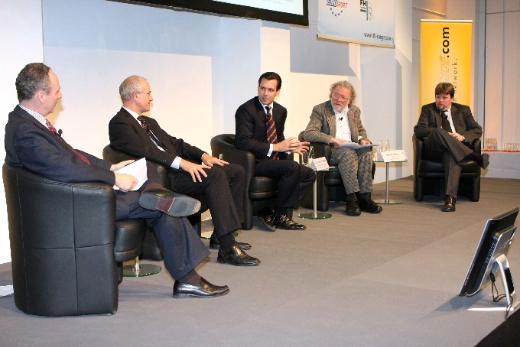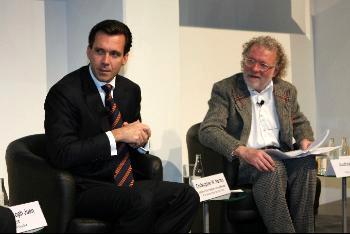3. ITB Hospitality Day - Panel about Service Design
 |
Berlin (April 4, 2008). The term may be new but the idea behind it goes to the very heart of the accommodation industry. Only the focus need change. A talk round at the 3rd ITB Hospitality Day in Berlin was dedicated to "Service Design". How should service be designed in order to generate higher turnover for the hotel. A chain hotelier, a private hotelier, an academic and a hotel association representative had much to say.
Andreas Pflaum from Pflaum’s Post Hotel in Pegnitz first met the term "Service Design" in 1990. For him, the term signifies the challenge of improving quality and personal service - "to make the guest a star and us hoteliers their assistants. We deal with their problems in order that they have more time for family and friends.W This, however, requires a certain type of staff, a fact that other members of the panel unanimously confirmed. Christoph Juen, CEO of the Swiss Hotel Association hotelleriesuisse (photo: second from left), reminded hoteliers as entrepreneurs, not to lose sight of profitability when applying such a philosophy.
Talk round participants defined service design as brand added value and service with authentic character - something that’s just as possible in a private hotel as in a chain hotel. Of course the chains are able to create various hotel brands covering the widest range of guest needs (what they indeed already do). Accordingly, it’s all the more important for the individual hotelier to appear authentic and target group orientated. The hotelier no longer needs to be able to do everything, but what he does do, he must do well. In Switzerland, Juen went on, the recognition of this fact has led to an initiative by several middle segment hotels whereby each contribute its best talents to a new consortium: One takes care of marketing, the other of drinks purchasing, the third is responsible for technology. This way, each hotelier can free himself of some of the burden and concentrate with increased focus on guest satisfaction. According to Juen, "the guest is prepared to pay more for service and added value, but not for freely interchangeable mass goods."
 |
| The luxury chain hotelier and the luxury private hotelier: Christopher Norton and Andreas Pflaum. |
But how do you get this across to staff in the hotel? "At Four Seasons, we no longer speak of training but of learning, of learning managers and learning young people," Christopher Norton said, Regional Vice President of the luxury hotel group and General Manager of the famous Hotel George V in Paris (right photo).
"Learning means remaining dynamic and opening yourself up to new ideas." Four Seasons has for decades no longer selected its staff according to qualification but according to skills and attitude. Peter O’Conner, Director of ESSEC Business School in Paris (photo: very right), agreed. "If we take the right people, it’s generally not important what we teach them in the programmes." Chris Norton sees the next ten to 15 years in which the ”millennium kids” will grow up with their mobile phones, computers and multi-tasking and begin to enter the world of work as an important stage in evolution.
"We need a new generation of staff!"
Here, Andreas Pflaum (photo in the middle) returned to the point about the interchangeability of today’s hotels: "We need a new generation of staff!" he reiterated. The desired individuality in service design is a matter of personality. Chris Norton compared a `personal` hotel with the best of three adjacent bagel shops in New York: Two are empty and the other is always full because the manager of that shop provides quality with personality. Here Peter O’Connor added: Yes, these factors are important, but just as important is meeting the needs of the market. He argued for an "à la Carte" service in the hotel and compared the hotel industry to the airline industry: Why should a budget hotel not ask for more for a room with a window? easyhotel does exactly that. And CitizenM will in future do away with the reception because all bookings are made online. Hotels will thus be tailored more closely to the core needs of guests. Who wants more, pays more. "In future, we won’t be able to afford to provide everyone with everything," Peter O’Connor stressed resolutely.
"Who would have thought that we would have to pay extra for luggage?" the host Joe Strodel sighed, Director of Corporate Relations at Cornell University/School of Hotel Administration (photo: very left), and continued: How can hoteliers maintain their prices and competitiveness when guests want more luxury at lower prices? For the analyst O’Connor it was clear: You have to define what luxury is and what the guest is prepared to pay for this experience. That this works was confirmed by Andreas Pflaum: The "Gourmet Opera", that he’s staged for years in the hotel (one act between each course) conveys the feeling not only of good food but of quality entertainment. And that pays: The more authentic and quality orientated the whole thing is, the quicker one moves along the new course of service design - that as, the path towards increased turnover.
Sometimes you just have to create needs, Chris Norton added and referred to luxury limousines for 96,000 Euros. These are cars that find buyers, he said, because 14 engineers worked on the sound of the car alone and nine on its smell. Looking at the product from this perspective, value for money is suddenly very clear. "Make people fly," he exclaimed before adding soberly: "Give the guest one promise and fulfil it and he’ll be happy. Guests are disappointed only when you promise ten things and fail to deliver on any one."
With this, service design as topic of the future comes back to the core of accommodation industry. / map
To print this article you have to be registered and logged in for newsletter, visitor or subscription.





